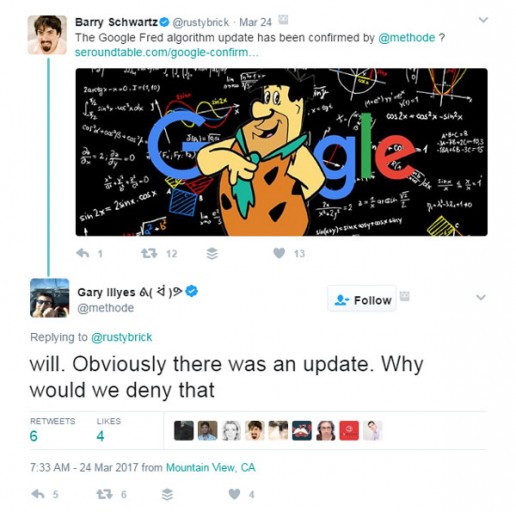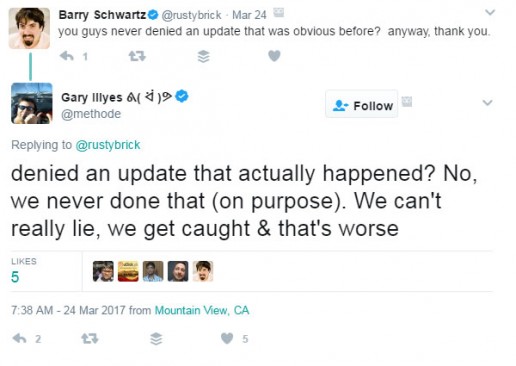Google delivers mixed messages about its latest algorithm update.
As of today, Google’s Fred update is alive and well. But as recently as this past Friday, Fred appeared to be dead—or at least in a very deep slumber. So what’s the story behind Fred’s revival?
On Friday, Search Engine Land News Editor Barry Schwartz reported on comments made by Google Webmaster Trends Analyst Gary Illyes at the search engine marketing conference SMX West. During his AMA chat at SMX West, Illyes wouldn’t confirm if or when Fred would take effect. Schwartz saw this as as a sign of Google’s public disavowal of the algorithm update.
On Saturday, Illyes took to Twitter to deny Schwartz’s charge that Google was abandoning Fred: (see image A1)
According to a subsequent report by Schwartz, Illyes stated that the Fred update targets those who violate Google’s webmaster guidelines. However, Illyes wouldn’t identify the specific guidelines being violated. Coincidentally, it was Illyes who bestowed the Fred name on the algorithm update, arguing that all future Google updates should receive this designation.
Schwartz believed that Illyes exhibited Google’s trademark reticence in providing the public and press with straightforward information. This past weekend Illyes responded to Schwartz’s speculation that Google may have already put Fred into effect without telling anyone about it: (see image A2)
Schwartz is skeptical about Illyses’s claim in today’s Search Engine Roundtable, observing that “Google has ‘no commented’ us plenty of times or just not responded or just given the line, we do updates all the time.” We’ll probably never know if Google had planned on shelving the Fred update indefinitely until Schwartz shone a spotlight on the matter, or if Google had planned on releasing Fred eventually whether or not Schwartz spoke out.
Rumblings within the SEO community about the Fred update began earlier this month. Google has revealed little about Fred, although Schwartz and webmasters in general believe the update will target low-value content sites that rely on heavy ad placement without offering any substantive benefits to the user.
We can certainly see why Google would make such sites verboten—after all, everyone can relate to the unpleasant experience of being inundated with ads when it was least expected. What makes less sense is why Google honchos dismissed and diminished the questions and concerns of Schwartz and other online journalists. Perhaps the Great and Powerful Google has a divine plan for us after all that we aren’t meant to know until the time is right.

